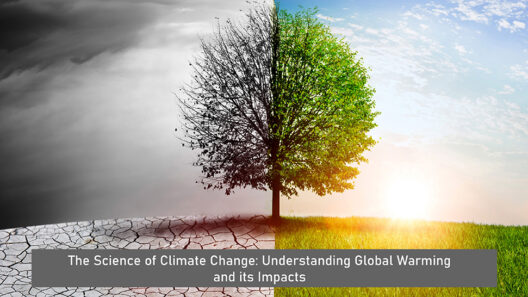As temperatures rise and heatwaves become increasingly prevalent, the economic ramifications of global warming emerge as a critical focal point of discussion. The intricacies of this relationship between climate change and economics are profound, extending beyond mere fluctuations in weather patterns to impact various sectors crucial for societal progression. Understanding these dynamics is essential for comprehending the full magnitude of global warming’s consequences.
Initially, one might observe that heatwaves disrupt standard economic activities. For instance, agriculture—one of the cornerstones of global economies—faces immense challenges due to extreme heat conditions. Crops suffer from diminished yields, and certain species become increasingly susceptible to diseases, pests, and wilt. Such impacts precipitate increased food prices, affecting consumers and eroding purchasing power. This is particularly pronounced in developing nations, where food insecurity already poses a significant threat to stability.
Additionally, the agricultural sector’s decline influences ancillary industries, exacerbating the economic toll. Fertilizer and pesticide sales dwindle as farmers struggle to maintain crop viability, leading to ripple effects across supply chains. The interdependence of economic sectors illustrates the cascading nature of climate-related disruptions, wherein struggling agriculture can precipitate declines in retail, logistics, and manufacturing.
Moreover, urban areas are particularly vulnerable to exacerbated heat conditions. Cities often experience the urban heat island effect, where urbanization leads to significantly higher temperatures than surrounding rural areas. This phenomenon not only influences the quality of life for residents but also incurs considerable economic costs. Increased energy consumption is one of the most notable ramifications, as air conditioning use surges to counteract oppressive heat. As demand for electricity escalates, so too does the strain on power grids, leading to potential outages. The economic implications of energy disruptions can be severe, particularly for businesses reliant on consistent power supply. Downtime can equate to lost revenue and diminished productivity.
Compounded by these challenges is the rising incidence of health-related issues linked to extreme heat. Heatwaves significantly augment the likelihood of heat-related illnesses, placing increasing burdens on healthcare systems. Higher healthcare expenditures drain public and private resources, diverting funds from critical sectors such as education, infrastructure, and innovation. Many individuals may find themselves unable to work due to heat-induced maladies, resulting in diminished economic output and a constrained labor market. Consequently, the economic fabric of societies is weakened, revealing the interconnectedness of climate change and public health.
The construction industry also faces vulnerabilities in the face of escalating temperatures. Workers exposed to extreme heat are subject to decreased productivity and increased health risks, raising concerns about labor safety regulations. As a response, companies may be compelled to implement additional safety measures or reduce work hours during peak heat events. Such adjustments may lead to increased operational costs and delays in project timelines, thereby impacting regional economies and construction budgets.
In addition, real estate markets reflect the economic ramifications of climate change and heatwaves. Properties located in areas prone to extreme heat are often perceived as less desirable, which can lead to declines in property values. As heatwaves become more frequent, prospective buyers may be reluctant to invest in homes that bear the risk of overheating, propelling a shift towards climate-resilient properties. Investors must adapt to this evolving landscape, reassessing value propositions based on environmental factors. The real estate market thus becomes a microcosm of broader economic trends, signaling the urgent need for sustainable development and climate adaptation measures.
Insurance industries are not immune to the repercussions of heatwaves either. Increased claims related to heat damage, crop failures, and health complications can threaten the financial viability of insurers. Companies may elevate premiums, limiting access to affordable insurance for households and businesses alike. This vicious cycle reflects a growing awareness of climate risk, prompting the need for innovative insurance products tailored to climate resilience and environmental contingencies.
Furthermore, economic paradigms must evolve to account for the profound influence of climate change on global markets. The traditional notion of growth often overlooks environmental sustainability, leading to consequences that ripple through economies. For instance, energy innovations and green technologies hold promise for mitigating some of the economic effects induced by climate change. Investment in renewable energy sources not only curtails reliance on fossil fuels but also generates economic opportunities through job creation, technological advancements, and sustainable practices.
On a policy level, governments face an immense challenge in addressing the economic fallout of increasingly frequent heatwaves. Developing comprehensive climate strategies that integrate economic resilience is paramount. This entails investing in infrastructure that withstands extreme weather events, promoting energy efficiency, and fostering public awareness regarding the importance of sustainability. By laying the groundwork for adaptive and anticipatory policies, governments can mitigate the economic ramifications of global warming.
In conclusion, the economic heatwave engendered by global warming extends its reach into various sectors, disrupting the intricate web of human activity. From agriculture to healthcare, energy consumption to real estate, the costs associated with climate change inform a re-evaluation of economic practices and policies. Recognizing and addressing these interconnected challenges is imperative for fostering resilience in a world increasingly impacted by climate change. Only through collaborative, innovative approaches can societies hope to navigate the complexities of an evolving planetary climate and cultivate a more sustainable economic future.








